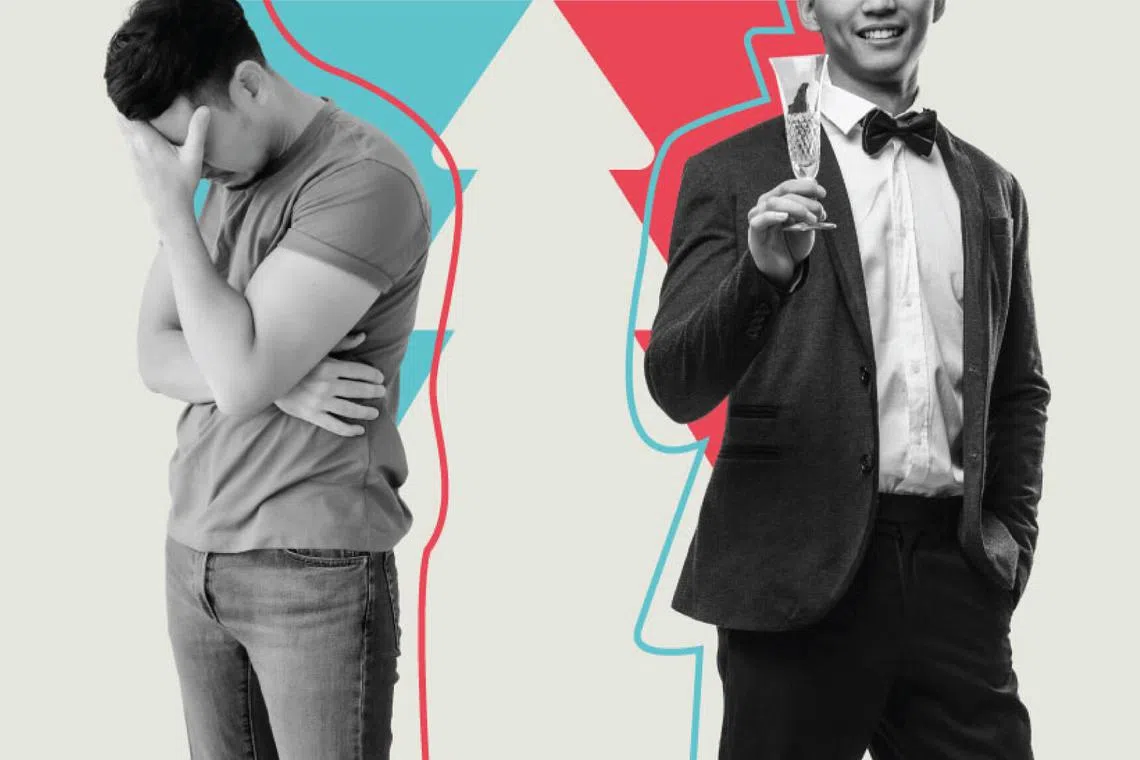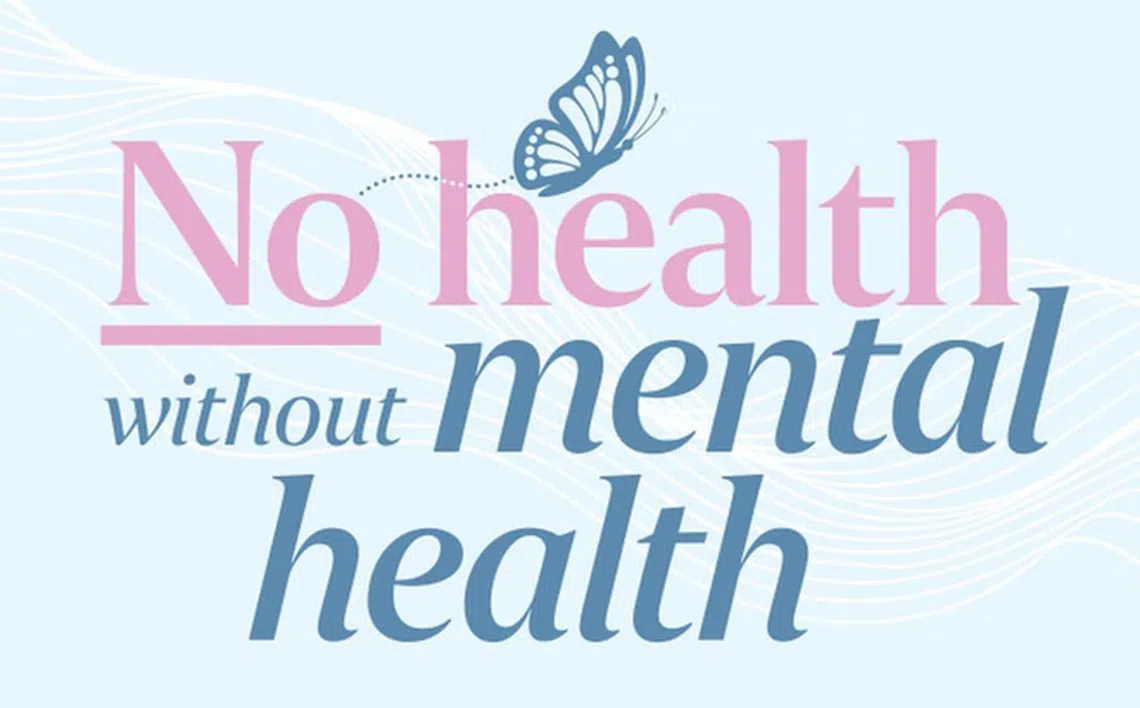No health without mental health
Views From The Couch: Coping with festive blues – be kind to yourself this season
Sign up now: Get ST's newsletters delivered to your inbox

The holidays can magnify the pressure of not fitting into the mould of what this time of the year “should” look like.
PHOTO: ST ILLUSTRATION
SINGAPORE – The holidays are here again – that time of the year when shopping malls are decked out in twinkling lights, Christmas carols play on a loop, and our social media feeds are flooded with pictures of families on holiday or friends at festive gatherings.
For many, it’s a season of joy, connection and celebration. But for others, the holidays can magnify feelings of loneliness or grief, or the pressure of not fitting into the mould of what this time of the year “should” look like.
At my last count, nearly 20 families among my friends and patients are heading off to Japan for the year-end break. If you’re not one of them, and you’re spending Christmas at home wondering why you’re not swept up in the festive cheer, know this: It’s perfectly okay to feel the way you do.
The truth is, not everyone experiences the holidays as joyful. Back in 1967, psychiatrists Thomas Holmes and Richard Rahe developed the Social Readjustment Rating Scale to measure the stress caused by life events.
Major festivals, including Christmas, made the list – not because they’re inherently bad, but because they can bring significant emotional shifts. The pressure of planning, managing family dynamics or navigating feelings of exclusion can often make the holidays more overwhelming than uplifting.
Social media adds another layer of pressure – Instagram and Facebook feeds overflow with images of lavish parties, extravagant holidays and perfectly curated celebrations. Even when the posts are meant to be light-hearted, they can feel like humblebrags, leaving others to compare their own experiences and feel inadequate.
Family WhatsApp groups, a quintessentially Singaporean phenomenon, can heighten this pressure with their steady stream of updates about gatherings, celebrations and achievements. One patient told me: “It’s not like I’m unhappy for them, but scrolling through their messages makes me feel even more alone.”
As Christmas blends seamlessly into New Year’s Day, it marks not only the close of the month, but also the end of the calendar year.
For many, this period is a natural time for reflection – thinking about what you’ve achieved or lost, and what you hope for in the year to come. For some, this introspection feels fulfilling.
For others, however, it can feel heavy. One patient described it as being trapped in “a highlight reel of everyone else’s achievements”, leaving her feeling like she had fallen behind. Social media only amplifies this effect, with highlight reels of travel photos, gifts and New Year resolutions, all captured in perfectly edited snapshots.
And just as we catch our breath after Christmas and New Year, the decorations and twinkling lights will soon be replaced with bold red-and-gold banners, fortune gods and images of snakes (2025 being the Year of the Snake).
The swift transition can feel jarring, especially if you’re still processing the emotional weight of the year end.
If this resonates with you, you’re not alone.
When festivities trigger grief
Holidays often amplify emotions, especially for those grieving a loss. The joy and togetherness so often associated with Christmas and Chinese New Year can feel like sharp contrasts to the void left by the absence of a loved one.
A patient once shared how Christmas, her favourite time of the year, had become a “cruel marker of absence” after her father’s passing. The empty seat at the dinner table and the memories of past celebrations made the season more about enduring than enjoying. Another described the loneliness of New Year’s Eve: “I see everyone celebrating, but for me, it’s a reminder that I have lost my wife forever.”
Social media can deepen this pain. Seeing posts about joyful reunions or heartfelt tributes can make loss feel more pronounced. Even well-meaning posts can serve as reminders of what’s missing in your life.
It’s important to give yourself permission to grieve in your own way. If certain traditions feel too painful, it’s okay to skip them. If you find solace in creating new traditions or reconnecting with old ones, that’s valid, too. For some, healing comes through acts of remembrance – lighting a candle, preparing a dish a loved one enjoyed, or writing them a letter.
There’s no right or wrong way to navigate grief during the holidays. Honour your feelings without judgment.
Social fatigue and festive expectations
For many, the holidays don’t end with Christmas. Chinese New Year falls on Jan 29 next year, just a month after Christmas. The back-to-back nature of these celebrations can leave people feeling drained.
The financial strain of these consecutive celebrations can also take a toll. From Christmas gifts to Chinese New Year hongbao, the expenses can quickly add up. WhatsApp family groups buzzing with updates about reunion dinner venues, gift exchanges and coordinating visits can create additional pressure, turning what should be simple celebrations into complex logistical and financial exercises.
One friend told me: “I barely survived Christmas, and now I have to deal with Chinese New Year. Big meals, nosy relatives and endless questions like, ‘When are you getting married?’ or ‘When are you having kids?’ It’s exhausting!”
These questions may feel intrusive, especially if you’re dealing with private struggles like relationship issues, fertility challenges or career uncertainty.
There is also the familiar “tradition” of comparing children’s (and adults’) achievements during family gatherings. A parent once shared with me how difficult it was to hear relatives discuss grades, scholarships and awards when her child was struggling academically. Such conversations, even if unintentional, can leave both parents and children feeling inadequate or judged.

Chinese New Year falls on Jan 29 next year, just a month after Christmas. The back-to-back nature of these celebrations can leave people feeling drained.
PHOTO: REUTERS
For introverts, the relentless pace of socialising can feel like an emotional marathon. Even extroverts can feel stretched thin by the sheer volume of events, especially if family dynamics add tension to the mix.
Remember, it’s okay to say no. Protecting your emotional energy isn’t selfish – it’s self-care. Consider planning your engagements with intention. Prioritise gatherings that bring joy and skip those that feel like obligations.
Coping strategies for festive blues
If you’re struggling with holiday blues, here are some practical ways to navigate the season:
1. Volunteer your time
Giving back can lift your spirits. Consider volunteering with organisations like Willing Hearts or Singapore Red Cross. Helping others provides a sense of purpose and connection.
2. Reconnect with someone
Reach out to a friend or family member you haven’t spoken to in a while. A simple text message or coffee meet-up can remind you that connection doesn’t have to be extravagant.
3. Create your own traditions
Spend the day doing something meaningful to you. It could be cooking a favourite dish, taking a quiet walk, or binge-watching a comfort series.
4. Embrace quiet moments
Seek out peaceful spaces like East Coast Park or Sungei Buloh Wetland Reserve. A little stillness can go a long way.
5. Watch your alcohol and food intake
Indulgence is part of the season, but too much alcohol or rich food can worsen low moods or anxiety. Enjoy treats in moderation, stay hydrated and listen to your body.
6. Be kind to yourself
Honour your feelings without judgment. If you’re struggling or facing a mental health crisis, reach out to someone you trust or seek support from organisations such as the Samaritans of Singapore (1767), or the Institute of Mental Health’s 24-hour hotline (6389-2222).
Finding meaning in simplicity
The festive season doesn’t need to be a grand spectacle. Social media may amplify pressure, but most posts are just highlights, not the whole story. Often, the simplest moments – a quiet coffee, a leisurely walk, or just sitting with your thoughts – bring the most peace.
As the year winds down, remember that the true spirit of the season isn’t found in perfectly wrapped presents or lavish celebrations. It’s in the gentle moments: the familiar aroma of your morning coffee, a kind message from an old friend, or the comfort of being exactly where you are, as you are.
At its core, these holidays are about kindness – not just towards others, but especially towards yourself. Whether you find joy in solitude or through reconnecting with loved ones, whether you’re celebrating or just getting by, your feelings are valid. Your way of experiencing this season is valid.
The best gift you can give yourself isn’t something money can buy; it’s the permission to be human, with all your complexities and contradictions. To feel what you feel, to heal at your own pace, and to find peace in your own way.
Wherever you are in your journey, I hope you find moments of genuine warmth and peace this holiday season. Remember, you’re not walking this path alone.
Wishing you gentle days ahead.
Dr Jared Ng is a psychiatrist, mental health advocate, and father of three teenagers – and four dogs. He is the founder and medical director of Connections MindHealth and was the founding chief of the Department of Emergency and Crisis Care at the Institute of Mental Health. When he is not helping patients or writing about mental wellness, he is trying to improve his beef stew. Dr Ng believes in embracing the ups and downs of life, especially during the festive season, and finding joy in the simple things that truly matter.



